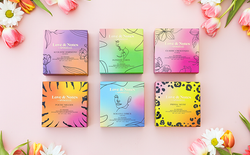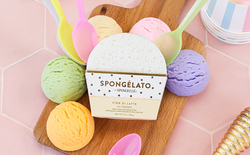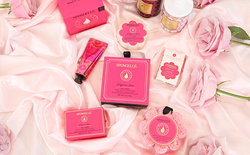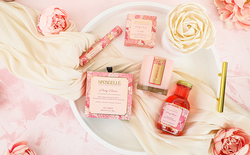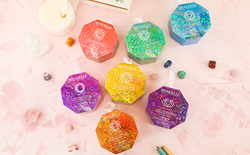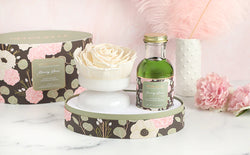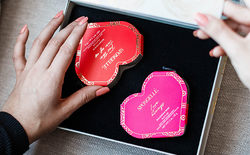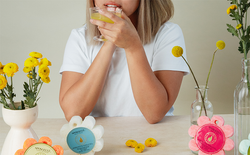Imagine this: after a long, action-packed day, you finally find a moment to unwind in the sanctuary of your bathroom. The water, heated to perfection, cascades down from the showerhead, its rhythmic drumming inviting you to a world of relaxation. As you reach for your favorite body wash, a question pops into your mind — “I wonder if this soap is expired?”
Often overlooked, this simple question hides an ocean of insights about our everyday personal care rituals. Whether it's a fragrant bar of soap or a soothing body wash, understanding their shelf life can enrich our skincare experience in surprising ways.
Does Soap Expire?
Alright, let's spill the suds — the short answer is that, yes, soap can expire. Just like that loaf of bread sitting on your counter, your soap also has a "best before" date.
But what does it mean when your soap expires? Is it still safe to use, and how can you tell? Don’t stress — we're here to break it all down as we cover what this really means.
Breaking Down Common Soap Ingredients
Just about all ingredients have a shelf life, and the medley of ingredients in your favorite bar or — or buffer! — of soap is no exception. Think of a shelf life as a countdown starting from the moment an ingredient is harvested or synthesized, ticking away until it's no longer at its peak.
When it comes to soap, common ingredients can include natural ingredients like olive oil, coconut oil, or Spongellé’s favorite, yuzu extract. These elements are the heavy lifters when it comes to moisturizing your skin, leaving it feeling soft and well-nourished.
Then there are the essential oils, bringing a bouquet of fragrances into the mix, transforming your everyday cleansing routine into a sensory experience that lifts your spirits.
Cleaning duty is left to the surfactants and detergents. Their job? Lifting dirt and oils from your skin and allowing water to wash them away, leaving your skin feeling clean and refreshed.
Some soaps also rely on preservatives to keep your soap fresh for longer, warding off unwanted microbial guests.
Lastly, we have the alkali s— lye and sodium hydroxide, to name a couple. These substances, though less well-known, are crucial players in the soap-making process. They react with oils, causing a chemical change that forms soap.
Each ingredient contributes to the soap's performance, aroma, and texture and, most importantly, determines the length of its shelf life. Now, what happens when soap moves closer to the finish line of its expiration date? Let's dive deeper.
Do Different Types of Soaps Have Different Shelf Lives?
Think all soaps are created equal? Think again. The type of soap — whether it's a humble bar soap, a handy liquid soap, a nourishing body wash, or your trusty hand soap — can greatly influence its lifespan. Each has its own clock ticking away, counting down to its best-before date.
Natural and handmade soaps are often crafted with a hearty dose of natural ingredients. While these natural soaps are a nourishing treat for your skin, they can also mean a shorter shelf life for your soap. That's because natural ingredients, free from preservatives, can turn rancid over time, reducing the soap's effectiveness.
On the other side of the soap spectrum are commercial soaps. Whether you’re looking at hand soap, shower gel, or antibacterial soap, these types of soap often contain synthetic ingredients and typically have a longer shelf life thanks to added preservatives, ensuring it stays fresh and effective for longer.
But there’s a catch. Research suggests that many common preservatives, while good for your soap's lifespan, might not be the best choice. They may interfere with our endocrine system, cause skin irritation in some people, and can harm the environment.
So where does that leave us? Well, looking for a balance that sits perfectly in the middle. Here at Spongellé, we've harnessed patented technology to create our vegan-friendly Body Wash Infused Buffers.
We use a time-release method to ensure the nourishing natural ingredients in our buffers last for a specific amount of washes, staying fresh each time. Even better, once the soap has been all used up, you can upcycle the sponge! It's our way of blending the benefits of natural ingredients with longevity for an elevated bath time experience you can indulge in again and again.
How Can You Tell if Your Soap Is Past Its Prime?
So, we've learned that soap can expire, but how do you spot a soap past its prime? Some signs might be more noticeable than others.
First, look at the packaging. Most soaps will come with either a “best by,” “expiration date,” or a “period after opening” (PAO) symbol. You'll usually find this information printed on the packaging or directly on the soap.
The PAO symbol looks like an open jar and will have a number followed by an 'M,' indicating how many months the product is good for once it's been opened. Beyond the date, though, there are other signs that an old soap has started to go bad.
Another sign lies in your soap's appearance. If your bar of soap has developed orange spots or shows signs of mold, it's likely time to toss it. In terms of liquid soap or body wash, changes in color or consistency can be red flags.
Another big tell? The lather. A rich, creamy lather is the hallmark of a healthy soap. If your soap no longer produces the bountiful bubbles it used to, it might be hinting at its past-due date.
An expired soap may also take on a different scent, especially if the essential oils have begun to go rancid. So if your soap isn’t smelling as fresh as it used it, this could be a clear sign that your soap has seen better days. After all, the nose knows!
Finally, listen to your skin. If you experience skin irritation after using soap, it might be a sign that the soap has expired. Rancid oils in expired soap can lead to discomfort and shouldn't be used.
What Happens if You Use Expired Soap?
Using a soap past its expiry date isn’t likely to be a huge safety risk, but it may not work as effectively. You might find it doesn't clean as well or produce that satisfying lather.
Using rancid soap can also impact the fragrance and likely make for a less pleasant bathing experience. In some cases, it could even cause skin irritation. So, it's best to use your soap within its intended shelf life for the most enjoyable experience.
How Can You Preserve Your Soaps for Longer Use?
So, how can you keep your soap fresh and effective for longer? The secret is all about storage. Your soap loves a dry place away from the direct stream of water. For bar soap, a ventilated soap dish is your best friend here — keeping your bar soap dry will help it last longer.
When it comes to liquid soaps and body washes, closing the cap tightly after each use can make a world of difference. This simple habit keeps out air and moisture, preserving the product's lifespan. Also, remember to store your liquid soap in a cool place, away from direct sunlight.
As for our Infused Sponges, each one comes with a chic ribbon, perfect for hanging in a dry place after use. This not only helps preserve the soap but also adds a delightful aesthetic touch to your bathroom decor.
The Bottom Line
Your soap is more than just a tool for cleanliness — it's an integral part of your skincare routine, a daily indulgence, a moment of pure serenity amidst the bustle of life. Knowing how to choose, use, and store it can transform your bath time into a uniquely enriching experience.
At Spongellé, we not only infuse nourishing key ingredients like glycerin, vetiver root extract, yuzu, and edelweiss extract into our products, but we also ensure they are vegan-friendly, paraben-free, and cruelty-free. Our Body Wash Infused Buffers are thoughtfully designed with bacteria-resistant properties, providing an elevated, hygienic bathing experience that takes the place of germ-ridden loofahs.
As we blend natural nourishment, sustainability, and practicality, we're dedicated to enhancing your skincare routine and making every last drop of soap count. With Spongellé, relish the simple joy of cleanliness, the luxury of exquisite skincare, and the satisfaction of an eco-friendly choice.
Here's to making the most out of every sudsy moment and letting your skin feel loved and cherished every step of the way.
ソース
Shelf Life and Expiration Dating of Cosmetics | FDA
Surfactant | Definition, Properties, Examples, & Facts | Britannica
Parabens and their effects on the endocrine system | PMC
Parabens as chemicals of emerging concern in the environment and humans: A review | PMC
